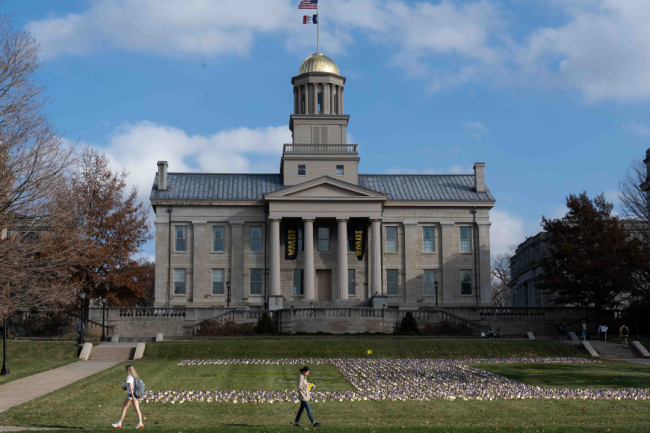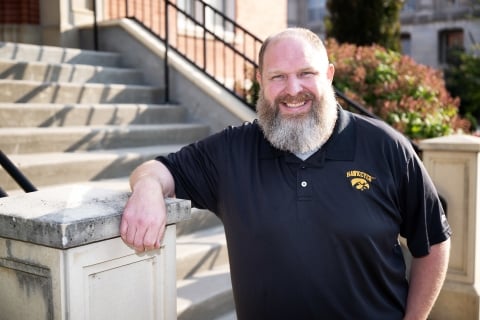You have /5 articles left.
Sign up for a free account or log in.

The University of Iowa hired an inaugural embedded counselor for student veterans, providing specialized services for military-connected learners.
The University of Iowa

Chuck Xander, a retired Army National Guard member, will serve as the University of Iowa's inaugural embedded counselor in veteran services.
The University of Iowa
Chuck Xander is the newest member in the University of Iowa’s Veteran Education, Transition and Support (IVETS) office, which offers support services, academic resources, financial aid and now mental health support for former service members and those who are dependents or beneficiaries of service members.
Prior to joining the team at Iowa, Xander served in the Army National Guard and was deployed in Iraq in 2003–04 before becoming a mental health professional. He’s been offering counseling services for 20-plus years.
Xander holds the inaugural role of embedded counselor at Iowa, but his position is also unique in the Big 10 and possibly in the nation, according to the university. Xander spoke with Inside Higher Ed about his background, his role and the need for additional supports for student veterans.
Q: What led you to a career in higher education?
A: I’ve always enjoyed helping—that’s been who I am; that’s why I got into the profession I got into. But also helping military-connected students succeed has been something that’s been a drive for me. As a veteran myself, I missed working with veterans when I stepped away from it. And I have to say, the GI Bill afforded me the opportunity to complete my undergraduate and later my master’s degree and without that, I wouldn’t have been able to be where I’m at. And so giving back to that … the College of Ed offered me a complimentary appointment to do some adjunct [teaching]. I’ve always enjoyed doing guest lecturing, so when they offered me that position, I honestly knew that’s where I needed to be in working with the students, teaching the students and working with veterans.
Q: What were you doing prior to this role? Where does your passion for working with veterans come from?
A: I worked for the VA [U.S. Department of Veterans Affairs] for about eight years prior to this, and I had stepped away for a few months for my own reasons. But being a veteran myself, I oftentimes say I sit in this chair because I probably should have been in that chair. I’m able to reduce that stigma to the other veterans as well as its automatic rapport. They don’t have to explain to me what a lot of the acronyms are, and I understand that, as a deployed combat veteran myself, I’ve been where they have been. Our stories are not the same or at the same time, but understanding that we have immediate camaraderie and rapport allows me to better meet their needs.
Q: You mentioned stigma; where do you think the stigma around mental health for student veterans comes from and why is that such a challenge to overcome?
A: Stigma in mental health, as a general statement, has really dwindled over the last—in my career—in the last 20 years. Students are now encouraged to go to therapy early in elementary school; it’s normal, like you go to your well-child checks. So [the stigma] is reducing there.
But from the military standpoint, most military members carry a what’s called a security clearance. And with that security clearance, [the Department of Defense] investigates every time you went to the doctor, went to a mental health professional, really, any time you sought help, and that can affect your security clearance. So a lot of people didn’t go to mental health [providers] because they didn’t want to have to be investigated for that.
As times have changed, that has been less of a problem, but partly because the veterans are used to going to therapy and so it’s more normalized, as well as the military is realizing that having mentally sound personnel helps them long term. And so allowing them to get away for three to six months to deal with what’s going on right now, it’s a small issue. If we prolong it, it can take a lot longer [to address].
Q: Why is it important to have specialized mental health care for student veterans or military-connected students?
A: My position was created through a generous donation from the Scanlan [Family] Foundation, with the understanding that it was working with military-connected students.
The University of Iowa has more than 600 student veterans. There’s about 1,600 military-connected students—so that’s usually using your family members’ benefits—so that’s about 2,200 students. Having that population … it’s a minority that’s rather large.
Students who are veterans or military connected, they’re not your typical traditional students. Student Veterans of America put out a stat that about two-thirds of student veterans are first generation. At the University of Iowa, it’s about one-third.
They’re about 27 years old; they have a lot more things to deal with in their life, whether it’s their age—they oftentimes have families. When they leave the military, camaraderie is one of the biggest things that almost all military personnel miss about the military. That is your family, that is who you have done things and seen things [with] that most people would never do. So understanding that they miss that mentality, that camaraderie, military family, we want to recreate that for them.
Oftentimes, because they’re older, they don’t fit into their cohorts or with their classmates, and that can be very isolating. As a nontraditional student, when I went back to grad school, I was in my 30s and I didn’t fit in, and so I understand where that comes from.
But just transitioning from military life to civilian life is a transition that most people don’t understand, and it’s hard. Also, a lot of people that transition out of the military are either in the National Guard or reserves, and so they still have military requirements to fulfill, which can pull them out of school. And it might be only one class here or there; it might be that they have to go to a mobilization—especially during COVID, a lot of students were pulled out to run COVID clinics. Or they have to go away to new schooling, and some schoolings can be a year, so there’s a lot more transitions that a veteran student has than the typical traditional student.
Q: What does a day in the life look like for you in your new role?
A: With my role being brand-new … the role is evolving, to say the least. We want to make sure that we build a good basis or model for other institutions to use and to benefit their student veterans. I want to be able to share with others so that other student veterans across the nation have this.
Because I’m on a small team and it’s a new position, my days don’t look the same. I see clients every day, and that can be as simple as anxiety. That can be, “Hey, I get in a fight with my significant other, can we just talk it out?” to processing trauma to drugs and alcohol therapy. So that’s part of my role.
The other thing is getting the word out. This is such a new position. Even [personnel at] the University of Iowa doesn’t know all of it, right? I’ve had more emails in the last week than I can count [saying], “Hey, I didn’t know your position was created. That’s so wonderful, like, how can we be a resource for each other?” And so that can pull in a lot of ways, but outreach, letting [the community] know.
We collect data for student veterans at the University of Iowa. It’s really hard; either they have to be using GI Bill benefits, or they have to self-identify so we know there are people who slipped through the cracks. So making sure that they know that they’re eligible, even if they’re not self-identified, or using GI Bill, that because you served in the military, you’re eligible for our services.
Q: What’s your student success philosophy?
A: I’m a very client-centered therapist. And so that’s my guiding principle in life; what the student needs is where I want to meet them.
Of course, I always want to push them to excel. Sometimes I have to bring back their expectations—we’re not all going to get 4.0s and run for president or be the CEO of the big company. But having that “Where’s the student’s centered at? What does success look like for them? What’s reality?” Because not everybody can do all of that stuff. Are they going to have to step away? Do they need to drop a course? Do they need to take one here and there? That’s where the biggest part is.
And then, honestly, the military teaches us a lot of skills, and how do we use those in our new stage and transition in life? They might not look the same. But they’ve taught us to deal with what we have, to make assessments, to make plans and then go with it. We have to learn, how do we take those skills that we learned and apply them to a new stage of life?
Q: What are your goals in your first year in your position?
A: So because it’s a new position, we want to make sure we get the word out. It’s so new, it’s inaugural, we know it’s the first on campus and in the Big 10, [and] we want to make sure everybody knows about it, that the veterans are using it, but also that the staff and faculty know that there’s a resource there when they don’t have the answers.
Building a structure and a model for other institutions to follow has been big for me, and we rolled it out pretty slow. We wanted to make sure that we didn’t have any hiccups … that we check all the boxes, we’re doing it right.
Personally, I want to make sure I identify a couple areas that, when they created that position that they might not have thought of. The people who created the position didn’t come from a mental health background, and so seeing how I can be a benefit from that. One of the things I really want to do is get some groups going. As I’ve shared, camaraderie is one of the biggest things that [former members of] the military misses. And so creating a group for camaraderie, just open sharing and building that, but also a therapy group, and because if they don’t feel comfortable in sharing what happened in the military, how do we bring that into therapy? So [those are] my first-year goals, but it’s evolving.
Longer term, we want to make sure that we can expand the program and that we can allow for more therapists, supervision as a therapist—we need to make sure that we provide supervision for that—as well as building connections with the larger VA and offering it to some of the smaller institutions around. And how do we build this for them? Is it that they have somebody that rotates through? Is it somebody that they have on call? How do we make that larger, but make the University of Iowa a destination for student veterans?
Seeking stories from campus leaders, faculty members and staff for our Student Success focus. Share here.



